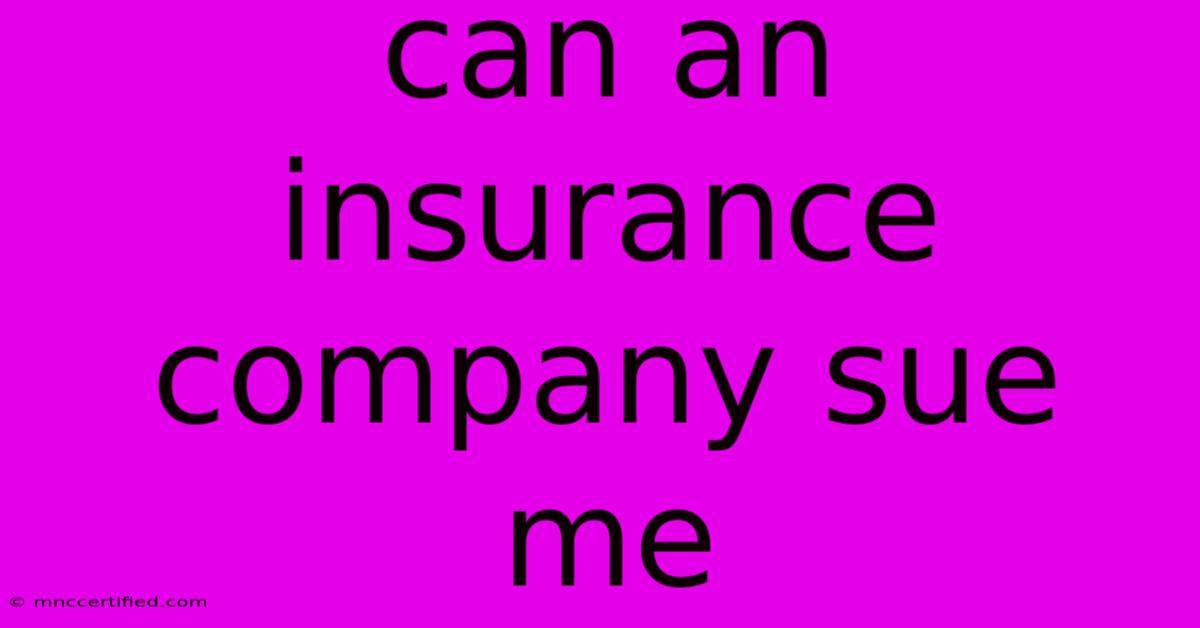Can An Insurance Company Sue Me

Table of Contents
Can an Insurance Company Sue You? Understanding Your Rights and Responsibilities
So, you've been involved in an accident, filed a claim, and now you're wondering: can an insurance company sue me? The short answer is: yes, under certain circumstances. This article will explore the situations where an insurance company might take legal action against you and what you can do to protect yourself.
When Might an Insurance Company Sue You?
Insurance companies are businesses aiming to minimize their payouts. They'll pursue legal action if they believe you've violated the terms of your policy or acted in a way that impacts their financial interests. Here are some common scenarios:
1. Fraudulent Claims:
This is the most common reason for an insurance company to sue. Submitting a fraudulent claim, whether exaggerating damages, providing false information, or claiming for events that never happened, is a serious offense with significant legal consequences. Insurance companies investigate claims thoroughly, and evidence of fraud can lead to lawsuits, criminal charges, and even hefty fines. Remember, insurance fraud is a crime.
2. Breach of Contract:
Your insurance policy is a legally binding contract. If you breach the terms of that contract, the insurance company might sue you. This could involve:
- Failing to pay premiums: Consistent non-payment can result in policy cancellation and potential legal action to recover outstanding amounts.
- Not cooperating with the investigation: Refusing to provide necessary information or participate in a fair claims investigation can be grounds for a lawsuit.
- Violating policy conditions: For example, failing to notify the insurance company promptly about an accident or making unauthorized changes to your property without informing them could lead to legal issues.
3. Subrogation:
After paying out on a claim, an insurance company might try to recover their losses from a third party. This is called subrogation. For example, if you're in a car accident and your insurance covers your damages, your insurer might sue the other driver to recoup the money they paid out. They might also sue you if they believe you bear some responsibility for the accident.
4. Recoupment of Payments:
If you receive a settlement or judgment from a third party after your insurer has already paid out on your claim, the insurance company may sue you to recoup the money they paid. This is particularly relevant in situations involving personal injury claims. This ensures the insurance company doesn't pay out more than what's legally owed.
Protecting Yourself from Lawsuits:
Here are some key steps you can take to minimize the risk of being sued by your insurance company:
- Be honest and accurate: Provide truthful information when filing a claim and cooperating with the investigation.
- Read your policy carefully: Understand the terms and conditions of your policy to avoid accidental breaches.
- Keep good records: Maintain meticulous documentation of all communications, claims, and related information.
- Seek legal advice: If you're facing a potential lawsuit, consult with an attorney specializing in insurance law. They can advise you on your rights and best course of action.
- Pay your premiums on time: This is crucial to maintaining your policy's validity.
Conclusion:
While insurance companies generally want to resolve claims fairly, they will take legal action when necessary to protect their financial interests. By understanding your policy, acting honestly, and cooperating with investigations, you can significantly reduce the likelihood of facing a lawsuit. However, if you find yourself in a difficult situation, seeking legal counsel is vital to protecting your rights. Remember, prevention is better than cure when it comes to avoiding legal battles with your insurance provider.

Thank you for visiting our website wich cover about Can An Insurance Company Sue Me. We hope the information provided has been useful to you. Feel free to contact us if you have any questions or need further assistance. See you next time and dont miss to bookmark.
Featured Posts
-
Hunter Live Stats Colorado Kansas Game
Nov 24, 2024
-
Classic Car Insurance No Garage
Nov 24, 2024
-
Illinois Upsets Rutgers Last Minute Score
Nov 24, 2024
-
Sunderland Millwall Clash Suspension Reasons
Nov 24, 2024
-
Arsenal 3 0 Forest Match Analysis
Nov 24, 2024